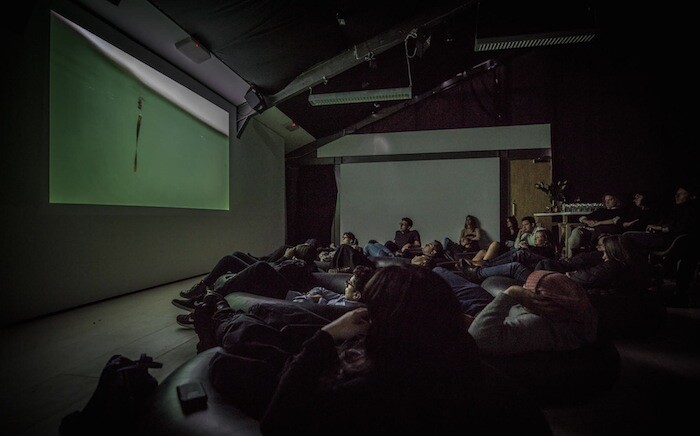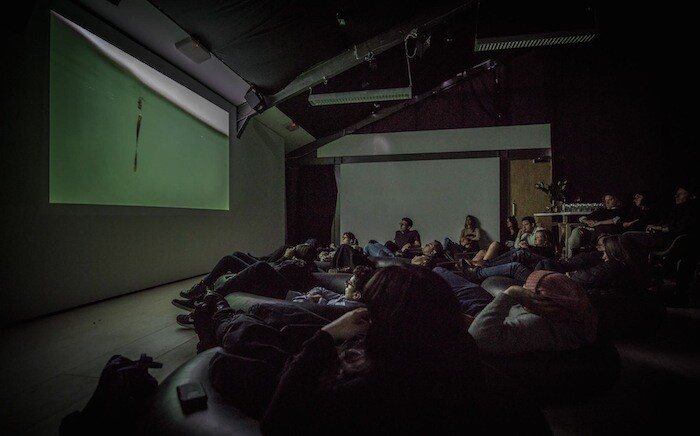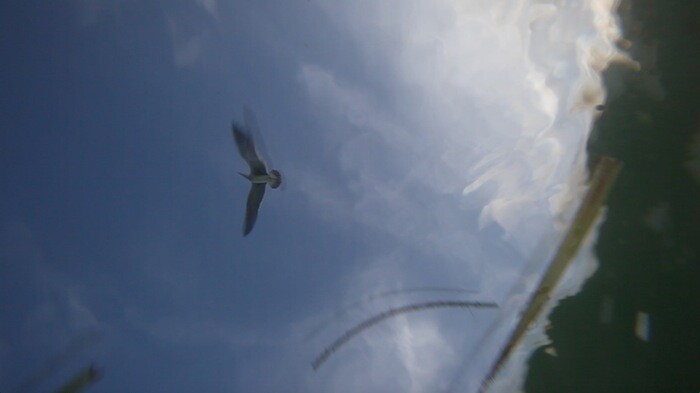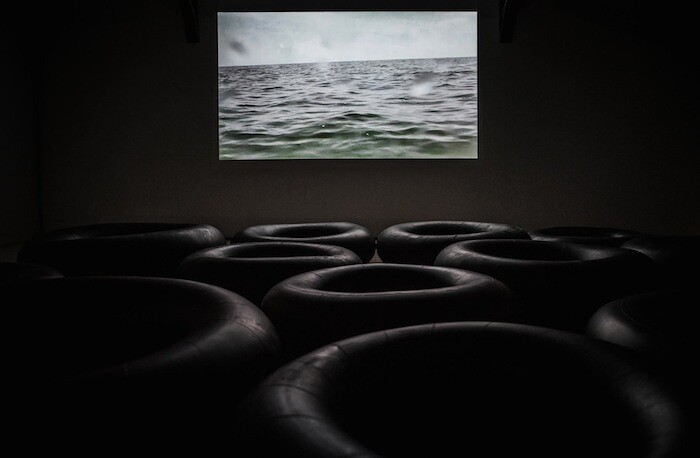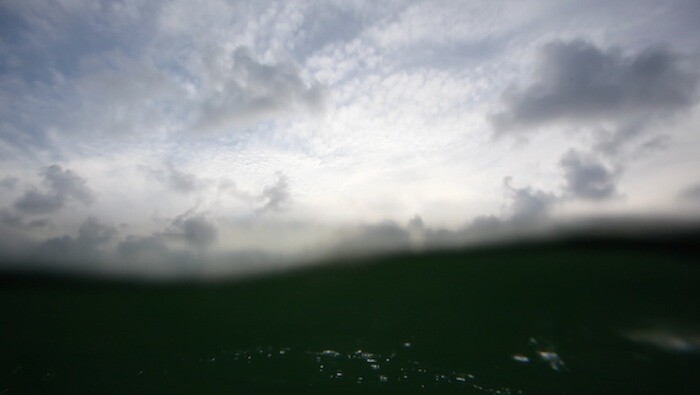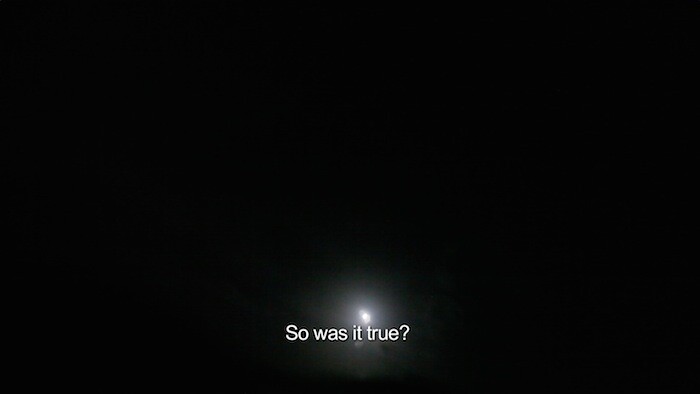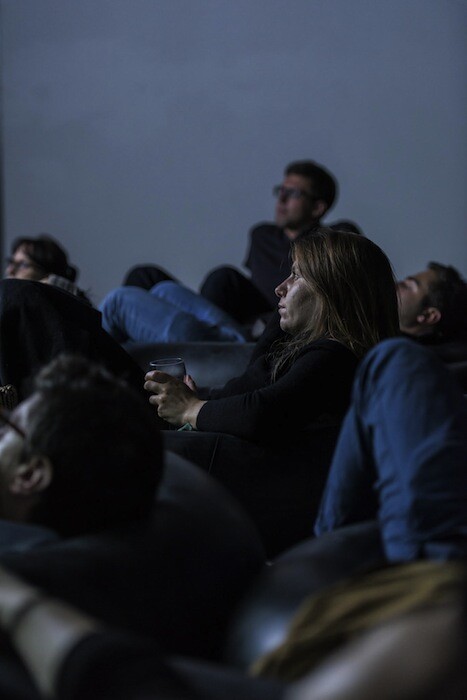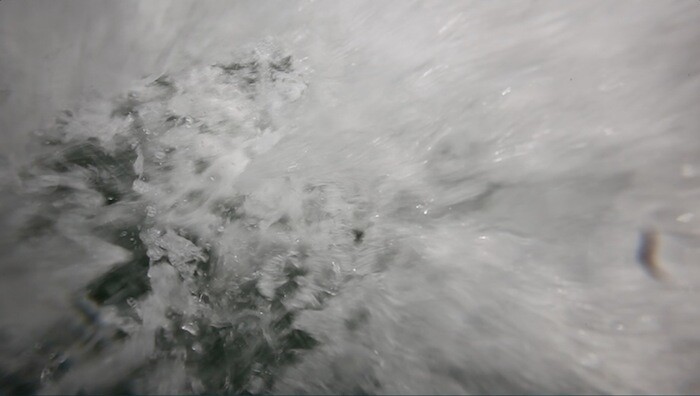Much is said and little is shown in Coco Fusco’s video installation And the Sea Will Talk to You (2012). We are on a raft, it seems, adrift in the middle of the Florida Straits, the camera dipping intermittently below the turquoise waves and back up to a blank horizon. A watery soundtrack washes back and forth rhythmically. The video’s narrative is told through first-person voice-over accounts in English and Spanish that detail two journeys heading in opposite directions: a family flees from Cuba to Florida on a rickety sea-going vessel; an American-Cuban woman—much like Fusco—catches a series of flights to return her mother’s ashes to the island. While the female narrator worries about being caught out and having her mother’s remains confiscated, the emigrant family contemplates sharks, uncertainty and death. The viewer is placed in the latter’s position, both in the point-of-view of the camera, and in the installation itself. On the gallery floor, in front of the screen, are an array of black rubber rings, the pungent inner tubes of tractor tires. I plonk myself into one. It’s uncomfortable—which is, no doubt, the point.
The work recalls specific histories of Cuban migration, notably the 1994 economic-political crisis that saw over 35,000 people take to the waters in makeshift rafts for a hoped-for better life in the USA. This traumatic “exodus” was also the subject of “Éxodo: documentos alternos (Exodus: Alternate Documents)” (2014), a group exhibition at Centro Cultural Español in Miami curated by Guillermo “Willy” Castellanos and Adriana Herrera, which included Fusco’s video. Viewers—many of whom may have been part of a Cuban diaspora—were asked to enter the room in which it was screening barefooted, leaving their belongings at the entrance. Similarly, during a screening at the Brooklyn Academy of Music (BAM) in 2012, Fusco handed out small glasses of water to viewers, perhaps suggesting the rafters’ meagre rations of fresh water. In London, the ceremonial aspect was muted, the black rubber rings providing the installation’s primary physical encounter. The work nevertheless reiterated Fusco’s ongoing commitment to issues of embodied identity and memory in her performance, video, and critical writing since the 1980s.1
And the Sea Will Talk to You might be understood as loosely autobiographical—Fusco is the child of Cuban migrants—but it is deliberately unclear whether the central female narrator represents the artist herself. The video is elegiac, and sometimes darkly funny. Speaking in the first person, the narrator describes an illicit transport done across a series of flights from New York to Havana. Worried that she will be forced to leave her “mother’s ashes in the mouth of a [police] dog,” she hides the sacral dust in a coffee can. At the U.S. border, a guard tests the suspicious dust for chemical weaponry, a process that involves turning a sample “into a paste.” To avoid a repeat of this ignominy, she sequesters the powder in a small cowrie-shell-encrusted “prenda,” a sacred object in the Santeria and Palo religions, which no one but a priest or the object’s owner is permitted to touch. Thankfully, the object is left unexamined by wary customs officials in Cancún. She finally lands in Havana, catches a taxi to a beach, steps into the water and casts the ashes into the waves. Her journey has been relatively easy.
The riskier voyage is recounted in the parallel narrative delivered in Spanish by a man and a woman. It is, they tell us, “a story of sadness filled with pain.” Sharks follow their raft its entire journey, and they encounter signs of others’ unsuccessful voyages (an abandoned raft, a child’s dismembered arm). The male narrator often tells his story in a magical realist register: before starting his voyage he learns to swim on dry land, “because you are already drowned;” as the story ends, he seems to hallucinate, his legs becoming an island, his eyes blooming with roses, and sand filling his chest. His voyage concludes in a visionary death, suggestive of a new, transfigurative beginning. The video concludes as a fable with the migrant’s words: “lying down as islands do, I look to the horizon and ask, ‘So is it true?’”.
And the Sea Will Talk to You memorialises migrant subjectivities, the trauma of rupture and the possibilities of redemption. This exploration of memory, fantasy and identity is hardly new—these motifs were, for example, a significant aspect of British and independent cinema of the 1980s, and of much moving image art since the 1990s—but Fusco’s work nevertheless remains prescient. Watching this video in September 2015 in London, the work resonated with the current plight of Syrian and other refugees, in boat journeys ending in death or uncertain survival on unsympathetic European shores. In the context of a Europe torn between humanist sympathies and racist xenophobia, the embodied empathy explored by Fusco is urgent and forceful.
Coco Fusco’s latest book Dangerous Moves: Performance and Politics in Cuba (Cambridge, Mass.: MIT Press, 2015) will be issued this October.
